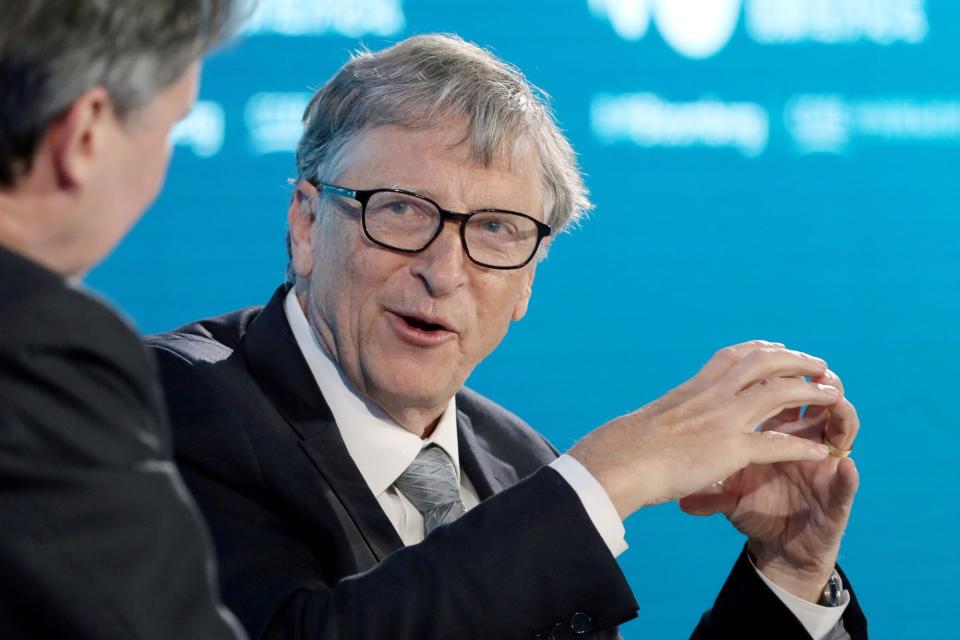Bill Gates Says His Axed Nuclear Reactor Is a Trade War Warning

(Bloomberg) -- Terms of Trade is a daily newsletter that untangles a world embroiled in trade wars. Sign up here.
When Microsoft Corp. co-founder Bill Gates tried to build an experimental nuclear reactor in China, his plan was thwarted by U.S. foreign investment restrictions. At Bloomberg’s New Economy Forum this week, Gates described the scuttled reactor project as “a five-year setback for technology.”
A chorus of industry leaders, economists and researchers echoed Gates’ cautionary tale during the event in Beijing. Trade tensions between China and the U.S. have spilled into business and economics in tangible ways, they warned, including a slower pace of technological progress and scientific research.
If relations between the two superpowers don’t get back on track soon, “we’re in danger of going back to the dark ages,” said Yahoo co-founder Jerry Yang. “We need to reestablish some level of trust between initiatives that can really promote and benefit the people of two countries.”
Open systems will inevitably win out over closed ones, Yang argued. He also cautioned U.S. companies that doing business in China may require some uncomfortable compromises.
“The challenge with doing business across countries with different value systems is really starting to be more apparent,” he said. “Foreign companies that choose to operate in China have to face the fact that you have to comply with their rules.”
Several Chinese tech company officials said they still wanted to work with American companies and that together, the two countries could further technological progress. “We’re in the 5G era, let’s not go back to the 2G or 3G era, where we had different standards,” said Lenovo Chief Executive Officer Yang Yuanqing.
Cooling political relations between Washington D.C. and Beijing have slowed international collaboration. In May, the U.S. subjected Huawei Technologies Co. to a variety of sanctions, citing security concerns. The company and other Chinese tech sector boosters believe the move was motivated more by fear of China’s rising influence over fifth-generation networking gear and artificial intelligence.
Huawei is Micron Technology Inc.’s largest customer, and on Thursday in Beijing, Micron CEO Sanjay Mehrotra told Bloomberg TV that the company has no plan to move U.S.-based manufacturing out of the country to facilitate supply to China.
Mehrotra was one of more than a dozen top tech company executives to attend the two-day forum, which was organized by Bloomberg Media Group, a division of Bloomberg LP, the parent company of Bloomberg News. Most were cautiously optimistic that one way or another, tech companies would find a way to work across borders.
It’s important to differentiate between the stance of the U.S. government and that of industry, said Parag Khanna, Managing Partner at FutureMap. “There’s always been a ‘silicon curtain’ when it comes to social media for U.S. companies,” he said, referring to the separate ecosystems that have developed in the U.S. and China. “But on hardware side, that’s the last thing they want.”
He said the head of supply chain at a major U.S. semiconductor supplier told him recently that they “don’t have a plan B for international revenue and access to a large important market like China. We have to find a way to keep selling to China.”
Zhu Min, chairman of the National Institute of Financial Research at Tsinghua University, put a finer point on it. Chinese imports accounted for about 65% of the $480 billion global chip market, he pointed out. “If trade friction stops chip exports to China, I think the whole global chip industry will break down,” Zhu said.
While global business leaders may want to sidestep the political and trade tensions and simply get back to making money, that no longer seems possible, said Diana Choyleva, chief economist at Enodo Economics.
“This is about a clash of ideology in terms of how the different systems view the internet, data, privacy and digital governance,” she said. “Whoever wins the technology race will be the global dominant power.”
A growing digital divide threatens to be expensive, as companies spend more on their own technological independence and compensate for the limitations of their domestic markets, said Hong Chen, CEO of the Hina Group, a Beijing-based advisory and private equity firm.
“But it also creates opportunities,” he said. Huawei, for example, might not have built its own mobile operating system if it knew it could rely on Google’s Android operating system. American sanctions were “a wake up call,” he said, spurring Huawei to create its own operating system that now attracts a whole new generation of app developers.
For smaller companies without Huawei’s deep pockets, the opportunities are more constrained. Spencer Deng, a co-founder of robotics startup Dorabot, which is backed by Kai-Fu Lee’s Sinnovation Ventures, said he built his business on the premise of unrestricted, cross-border trade.
“A separate supply chain will create a slower movement of goods,” he said. “That causes a slowdown for business and it’s not good for anyone.”
--With assistance from Colum Murphy and Gao Yuan.
To contact the reporter on this story: Shelly Banjo in Hong Kong at sbanjo@bloomberg.net
To contact the editors responsible for this story: Peter Elstrom at pelstrom@bloomberg.net, Janet Paskin, Colum Murphy
For more articles like this, please visit us at bloomberg.com
©2019 Bloomberg L.P.

 Yahoo Finance
Yahoo Finance 